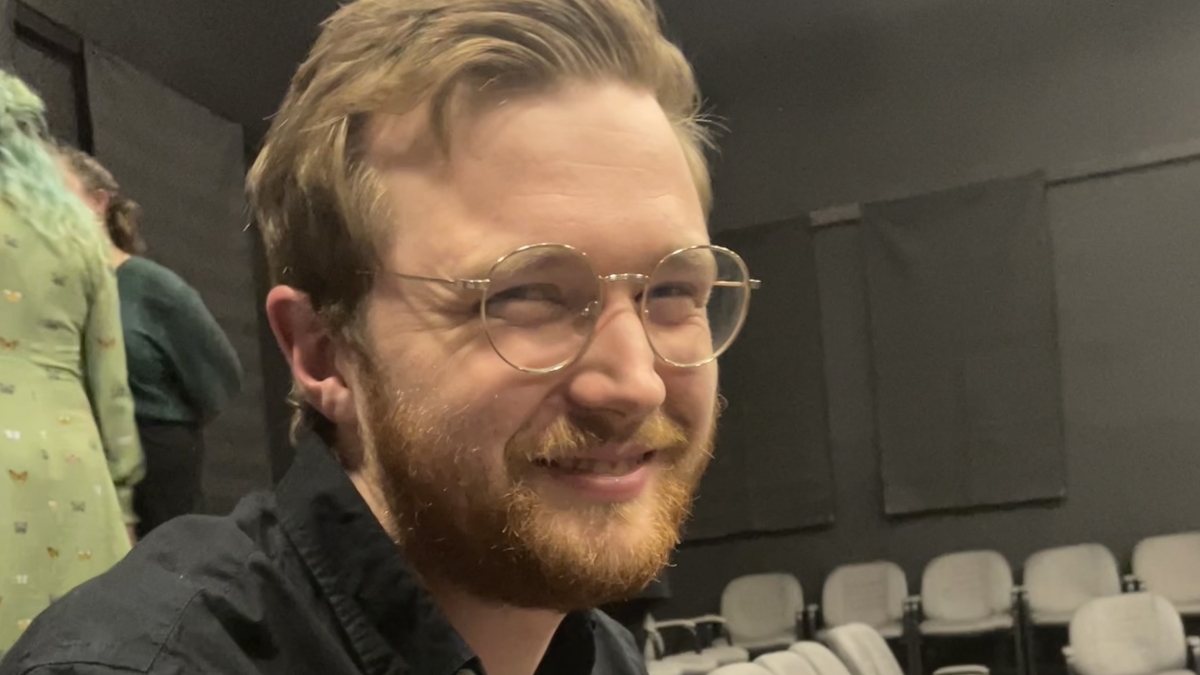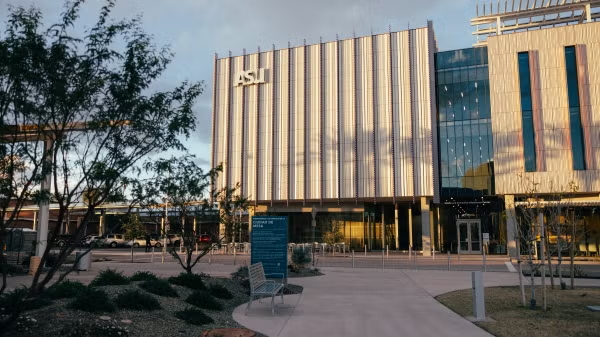Award-winning student playwright at ASU tells stories of rural America

Straton Rushing's plays have been featured with more than a dozen theater companies around the U.S. and internationally, and his work in radio theater has appeared on the “Theatrically Speaking,” “Garden of Voices” and “Between Acts” podcasts.
Straton Rushing was raised in an artistic family, with a songwriter father and a mother who played piano. His grandmother took him to summer camps in order to encourage his love of the arts.
Although he had always been around different forms of art, Rushing didn’t have much formal training or any real exposure to it in a professional setting. It was in high school that he cemented his love of theater and desire to pursue it as a career. As part of his AP English curriculum, his class traveled to see a production of Tennessee Williams’ “A Streetcar Named Desire'' at Texas State University. It was after that experience that Rushing knew what he was going to do with the rest of his life.
“I want to try that,” he remembers thinking. “I’m gonna die trying.”
Rushing is graduating from Arizona State University in May with an Master of Fine Arts in dramatic writing from the School of Music, Dance and Theatre.
Originally from Sonora, Texas, Rushing received undergraduate degrees in theater and philosophy from the University of Texas at Arlington. During his time at ASU, Rushing’s original plays have been recognized numerous times through productions and awards. During his first year at ASU, he presented his play “Enferma” as part of the 2021 New Plays Festival by Phoenix Theatre. He won the Bela Kiralyfalvi Playwriting Award sponsored by Wichita State University for college students with his play "Happy Wright," which he developed in the graduate writers' workshop and which was featured in ASU's Theatre Lab series in fall 2021. The play was subsequently produced by Wichita State University in 2022.
“I write about country folks,” Rushing said. “It wasn’t until I started opening my eyes to realize that it’s a very short list of playwrights that are writing about rural America.”
His plays have been featured with Phoenix Theatre Company, Capital Repertory Theatre, Arts Fort Worth, Orpheus Theatre Company, SceneShop, the University of Houston, the Savannah College of Art and Design, Scribe Stages, TheatreWorks New Milford, Focal Theatre Lab, Crafton Hills College, Festival De La Bête Noire and other companies around the U.S. and internationally. His work in radio theater has appeared on the “Theatrically Speaking,” “Garden of Voices” and “Between Acts” podcasts. His recent publications include plays in the Silk Road Review, Nine Cloud Journal, the Ponder Review and with Smith & Kraus. Several of Straton's titles are available on the New Play Exchange website.
Guillermo Reyes, artistic director of theater at ASU, said of Rushing: “Straton has built a playwriting resume that already showed him contributing to the field while a graduate student and will graduate with an excellent portfolio to contribute to the art form. Several of our graduate students excel after they graduate. Straton has been doing so while still a student, always finding the empathy of his characters and depicting their human struggles in a caring manner in the best tradition of American playwrights such as Williams, Wilson or O'Neill.”
Rushing said he wouldn’t be where he is right now without the support of his family and friends.
“There’s a lot of people who have had my back: my grandparents, my dad, my girlfriend,” he said. “Everyone who supported my crazy dream of being a writer.”
He shared more about this academic journey.
Question: What is an interesting moment or accomplishment during your time at ASU?
Answer: In 2022, I won the Hear Me Out Golden Ear award for “Caprice.” It’s a festival that’s about to go into its fourth year. It started when people realized Zoom theater isn’t very fun. The reason that award is special is because it’s about my hometown. It’s one of the first times that that part of my artistic voice was recognized. I wrote it for Dr. (Kristin) Hunt’s class originally.
Q: What’s something you learned while at ASU — in the classroom or otherwise — that surprised you or changed your perspective?
A: It really opened my eyes to what a play can be or what writing can be. I came in thinking, “I’m a playwright.” Getting to work with different schools and make cool, interactive stuff broadened my horizons. If I get a writing job doing something else, it’s still the creative part of the brain. It broadened my horizons and made me think about what I can do as a writer. That’s what I needed ASU for. You’ve got to be open to all these different doors.
Q: Why did you choose ASU?
A: I applied to a bunch of different programs. One thing that was a big factor in choosing ASU was the fact that it’s a dramatic writing degree and not a playwriting degree. If you want to pursue other things, there’s a lot of flexibility. The flexibility and the approach they have with grad programs is really unique. I knew that with other programs that wasn’t the case. At ASU, it is crazy the things we are cooking up. It was always something new. I ended up doing a lot of work.
Q: Which professor taught you the most important lesson while at ASU?
A: There’s a lot of them! I really appreciate that time and time again Karen Jean Martinson told me that the type of plays I wanted to write matter. (She) told me that if (writing plays about rural America is) what I’m drawn toward, that is what I should be writing about.
Guillermo Reyes is our biggest cheerleader. He’s got our backs. He’s always making us submit our stuff.
Robert Farid Karimi. He’s always there for me. It doesn’t matter what problem I have, he’s always got the answer to everything. We got to teach a class together.
Q: What’s the best piece of advice you’d give to those still in school?
A: If you are like me and you have a tendency to overextend yourself, be mindful of that. I was working too many hours a week. I believe in the value of hard work, but it hits a point where you are just so tired. It’s not always feasible. So, try to be mindful.
Q: What was your favorite spot on campus?
A: I usually make a beeline to wherever I need to be. But probably the Lyceum Theatre. That’s where all the grad students hang out. That’s where you’ll always find us.
Q: What are your plans after graduation?
A: I just accepted a job offer! I am going to be the director of sales and marketing for Theatre Arlington (a professional theater in the Dallas area). I am very excited about it.
Q: If someone gave you $40 million to solve one problem on our planet, what would you tackle?
A: Well, I don’t think we can cure cancer for $40 million. I would put a lot of money into funding the arts in rural communities. I’m not idealistic enough to think that theater can save the world, but it is still important and a good thing for our communities. It is good for us to be in community together and experience stories in the way theater does. I’m excited to see the new plays post-pandemic. A lot of theaters are struggling right now. Everyone is struggling; there are all these ways we’re still not fully recovered. I would encourage people to give live theater a chance. It’s good for us to be open to new ideas.
More Arts, humanities and education

Exceeding great expectations in downtown Mesa
Anyone visiting downtown Mesa over the past couple of years has a lot to rave about: The bevy of restaurants, unique local shops…

Upcoming exhibition brings experimental art and more to the West Valley campus
Ask Tra Bouscaren how he got into art and his answer is simple.“Art saved my life when I was 19,” he says. “I was in a…

ASU professor, alum named Yamaha '40 Under 40' outstanding music educators
A music career conference that connects college students with such industry leaders as Timbaland. A K–12 program that…

